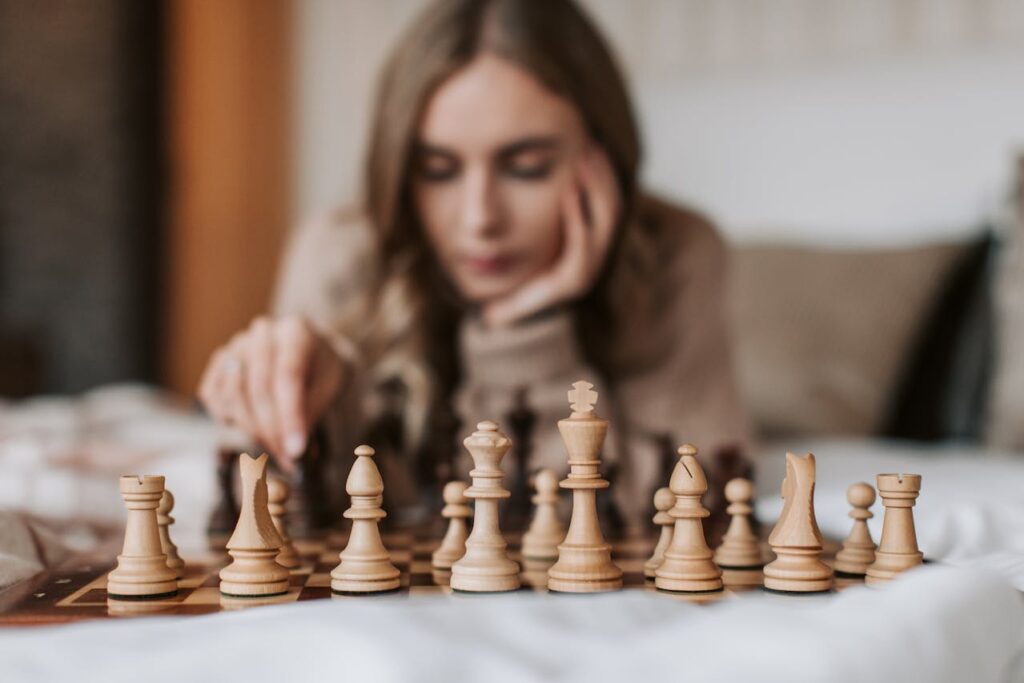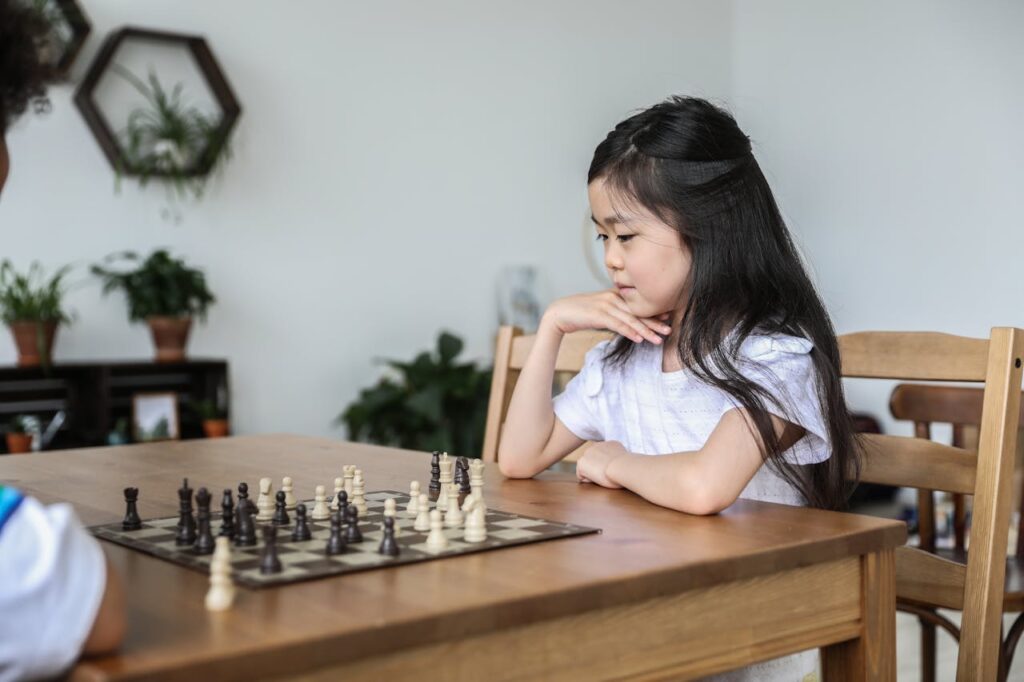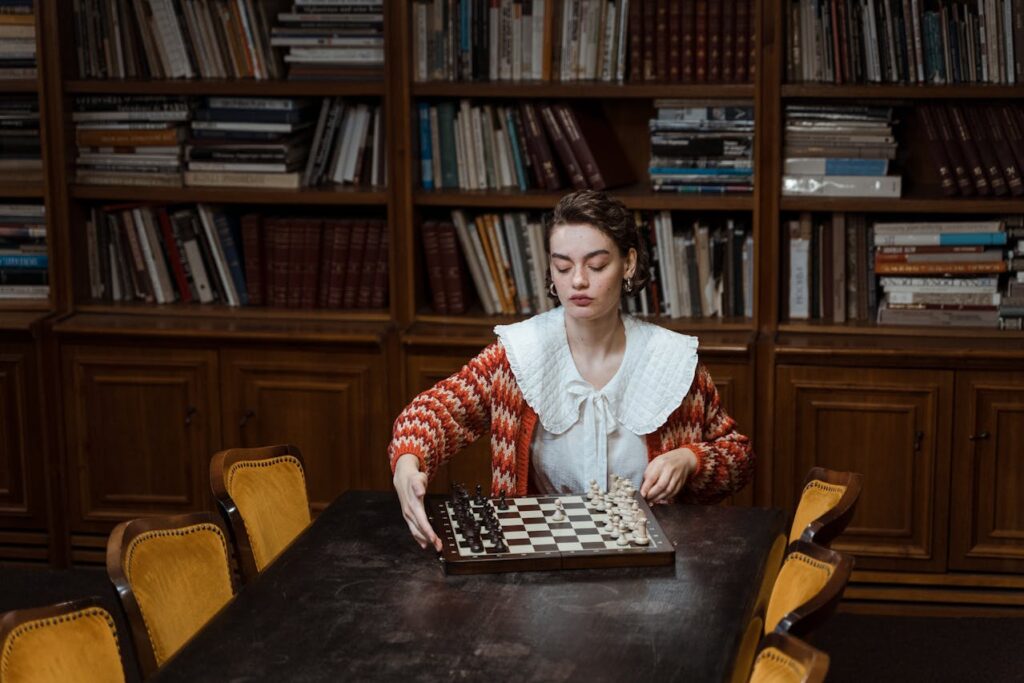When we think about creativity, chess might not be the first thing that comes to mind. Many people see chess as a game of logic and strategy, full of rules and strict patterns. But chess is also a game of infinite possibilities, where imagination and creativity can thrive. In fact, chess offers a unique and powerful way to unlock your child’s creative potential.
The Role of Chess in Developing Cognitive Flexibility
Cognitive flexibility is the ability to switch between different concepts or adapt to new information. It’s a crucial aspect of creativity, allowing individuals to think beyond the obvious and come up with novel solutions.
Adapting to Changing Situations
Chess is a dynamic game where the situation can change rapidly. A strategy that seemed promising a few moves ago might suddenly become risky, forcing players to rethink their approach.
This constant need to adapt helps children develop cognitive flexibility.
When playing chess, children must be ready to change their plans at a moment’s notice. They learn to stay open-minded and consider alternative strategies when things don’t go as expected.
This ability to pivot and adapt is a key component of creativity, as it allows children to explore new ideas and find innovative solutions when faced with challenges.
Encouraging Nonlinear Thinking
While chess is often associated with logical, step-by-step thinking, it also requires players to think nonlinearly.
Nonlinear thinking is the ability to connect ideas in unexpected ways, leading to creative insights and solutions.
In chess, this might involve seeing a move that others wouldn’t consider or recognizing a pattern that leads to a surprising victory.
Chess encourages nonlinear thinking by challenging players to look beyond the obvious and explore unconventional strategies.
Children learn to think creatively about how different moves can interact and create new possibilities.
This kind of thinking is essential for creativity, as it allows individuals to make connections that others might miss.

Balancing Creativity with Logic
One of the unique aspects of chess is that it requires a balance between creativity and logic.
While creative thinking is essential for finding new strategies and solutions, logical thinking is necessary to execute those ideas effectively.
Chess teaches children how to strike this balance, helping them become well-rounded thinkers.
In chess, creativity and logic go hand in hand. A child might come up with a creative strategy, but they’ll need to use logical thinking to determine whether it’s a sound plan.
This process of balancing creativity with logic helps children develop a more nuanced approach to problem-solving, where they can innovate while still considering practical constraints.
Chess as a Path to Original Thinking
Chess, with its infinite possibilities, nurtures a child’s ability to think originally. The game encourages children to explore new ideas and strategies that may not always conform to conventional wisdom.
This emphasis on originality is a key factor in creative development and is crucial for success in any field.
Encouraging Experimentation
In chess, there are countless ways to approach a game. No two games are exactly alike, and this open-ended nature encourages children to experiment with different strategies and tactics.
By trying out new moves and exploring uncharted territory on the chessboard, children learn that creativity often involves stepping outside of their comfort zone and taking risks.
This willingness to experiment is fundamental to original thinking. When children feel free to test out new ideas in chess, they develop the confidence to think independently and pursue unique solutions in other areas of life.
They learn that failure is a part of the creative process and that each mistake is an opportunity to learn and improve.
In school, this experimental mindset can help children approach projects and assignments with fresh perspectives.
Instead of simply following instructions, they may be more inclined to explore alternative methods, come up with innovative solutions, or present their ideas in a unique way.
Chess fosters this kind of original thinking by encouraging children to take creative risks and embrace the unknown.
Developing a Personal Style
As children become more experienced in chess, they often begin to develop their own playing style. Some may prefer aggressive tactics, while others might favor a more defensive approach.
This personal style is a reflection of their individual creativity and strategic thinking.
Developing a personal style in chess is not just about winning games; it’s about self-expression. Through the game, children learn to express their unique ideas and preferences, which is a critical aspect of creativity.
They discover that there are many different ways to play and that their approach doesn’t have to look like anyone else’s.
This sense of individuality is important for creative development. In life, children who are comfortable expressing their unique ideas are more likely to innovate and contribute original perspectives.
Chess helps nurture this individuality by providing a structured environment where they can explore and refine their personal style.
In school, this ability to develop and embrace a personal style can lead to more creative and engaging work.
Whether it’s writing a story, solving a problem, or creating a piece of art, children who have learned to express themselves through chess are more likely to produce original and meaningful work.
Embracing the Unpredictable
Chess is a game where anything can happen. Even the most well-thought-out plans can be disrupted by an unexpected move from an opponent.
This unpredictability is a powerful driver of creativity, as it forces players to think on their feet and adapt to new situations.
Embracing the unpredictable nature of chess teaches children to be flexible and open-minded.
They learn that creativity often involves dealing with uncertainty and that the best ideas sometimes come from unexpected places.
By facing and overcoming these challenges in chess, children develop the resilience and adaptability that are essential for original thinking.
In the classroom, this ability to embrace unpredictability can help children handle unexpected challenges and think creatively under pressure.
Whether it’s dealing with a surprise question on a test or adapting to a new project requirement, the skills they develop in chess will help them stay calm, think clearly, and find creative solutions.
How Chess Builds Confidence in Creative Expression
Confidence is a key component of creativity. Without the belief that their ideas have value, children may be hesitant to express themselves or pursue creative endeavors.
Chess provides a supportive environment where children can build this confidence, helping them become more comfortable with taking creative risks and sharing their ideas with others.
Overcoming Fear of Failure
One of the biggest barriers to creativity is the fear of failure. Many children are reluctant to try new things because they’re afraid of making mistakes or being judged.
Chess helps children overcome this fear by teaching them that failure is a natural part of the learning process.
In chess, every game is an opportunity to learn and improve. Even when a child loses, they can reflect on what went wrong and how they can do better next time.
This mindset helps children see failure not as something to be feared, but as a valuable experience that contributes to their growth.
By learning to view failure as a stepping stone to success, children become more willing to take creative risks.
They understand that trying new things, even if they don’t always work out, is an essential part of the creative process.
This confidence in the face of failure is crucial for developing original ideas and expressing creativity.
Building Self-Esteem Through Achievement
Winning a chess game, especially after a challenging match, can be a significant boost to a child’s self-esteem.
These achievements help children see the value of their efforts and build confidence in their abilities.
As they improve in chess, they develop a sense of pride in their skills, which encourages them to take on new challenges and push their creative boundaries.
This growing self-esteem is directly linked to creative expression. When children believe in their abilities, they’re more likely to share their ideas, try out new strategies, and experiment with different approaches.
Chess provides a platform for these achievements, giving children the confidence they need to express themselves creatively.
In school, this increased self-esteem can translate into more confident participation in class discussions, presentations, and projects.
Children who feel good about their abilities are more likely to contribute original ideas and take on leadership roles, enhancing their overall academic experience.

Encouraging Peer Interaction and Feedback
Chess is often played in social settings, whether in a classroom, a club, or online. These interactions with peers provide valuable opportunities for children to receive feedback and learn from others.
Engaging in discussions about strategies, moves, and outcomes helps children see their ideas from different perspectives and refine their creative thinking.
This peer interaction is a crucial part of the creative process. By sharing their ideas and receiving constructive feedback, children learn to improve their strategies and think more critically about their choices.
This collaborative environment helps them develop the confidence to express their creativity and engage with others’ ideas.
In the classroom, the ability to give and receive feedback is essential for creative growth.
Children who are comfortable sharing their thoughts and learning from others are more likely to collaborate effectively, contribute to group projects, and produce high-quality work.
Chess teaches them how to engage in these constructive discussions, building their confidence in creative expression.
Chess as a Gateway to Lifelong Creativity
The benefits of chess extend far beyond childhood. The creative skills and mindset developed through playing chess can continue to influence a person’s life well into adulthood.
Chess not only fosters creativity in the present but also lays the foundation for a lifetime of creative thinking and problem-solving.
Developing a Creative Mindset
One of the most significant long-term benefits of playing chess is the development of a creative mindset. Chess teaches children to approach problems with curiosity, flexibility, and an openness to new ideas.
This mindset is essential for creativity and can influence how they approach challenges in all areas of life.
As children grow and encounter new situations, the creative mindset they’ve developed through chess will help them adapt and thrive.
Whether they’re solving a complex problem at work, coming up with an innovative idea, or finding a new way to approach a personal challenge, the skills they’ve learned in chess will continue to serve them.
In adulthood, a creative mindset is invaluable. It drives innovation, supports personal growth, and helps individuals navigate an increasingly complex world.
By learning chess, children develop the foundation for this mindset, setting them up for a lifetime of creative success.
Encouraging Lifelong Learning
Chess is a game of infinite possibilities, and there’s always something new to learn. This constant opportunity for growth fosters a love of learning that can last a lifetime.
As children explore different strategies and tactics, they develop a passion for discovery and self-improvement.
This love of learning extends beyond chess. Children who enjoy the process of learning and improving are more likely to seek out new knowledge and skills in other areas of life.
Whether it’s picking up a new hobby, pursuing further education, or exploring a new career path, the curiosity and enthusiasm for learning developed through chess will continue to inspire them.
In the context of lifelong learning, creativity plays a crucial role. The ability to think creatively and approach new subjects with an open mind is essential for personal and professional growth.
Chess helps children develop these qualities, encouraging them to stay curious and engaged throughout their lives.
Applying Creative Skills to Real-World Challenges
The creative skills developed through chess are not limited to the chessboard.
They have practical applications in the real world, helping individuals solve problems, innovate, and think strategically in various situations.
Whether in their careers, personal lives, or communities, the ability to think creatively and adapt to change is a valuable asset.
For example, a child who learns to think creatively in chess may later apply these skills to designing a new product, solving a technical problem, or developing a unique marketing strategy.
The problem-solving abilities, cognitive flexibility, and original thinking fostered by chess can lead to success in a wide range of fields.
In the broader context of life, these creative skills can help individuals navigate challenges, build strong relationships, and contribute to their communities.
Chess provides the foundation for these abilities, giving children the tools they need to succeed in whatever paths they choose.
How to Encourage Your Child’s Creative Growth Through Chess
If you’re convinced that chess can unlock your child’s creativity, you might be wondering how to get started.
Here are some practical steps to encourage your child’s creative growth through chess, helping them develop the skills and mindset they need to thrive.
Create a Fun and Supportive Environment
The first step in encouraging creativity through chess is to make the experience fun and enjoyable for your child.
Provide a supportive environment where they can experiment with new ideas, try out different strategies, and learn from their mistakes.
Celebrate their successes and encourage them to see every game as an opportunity to learn and grow.
At the Global School of Chess, we emphasize creating a positive and engaging learning environment where children can explore their creativity while developing their chess skills.
Our lessons are designed to be both educational and fun, helping children discover the joy of creative thinking through chess.
Encourage Exploration and Experimentation
To foster creativity, encourage your child to explore different strategies and experiment with their moves.
Let them know that there’s no single “right” way to play chess and that trying new approaches is an essential part of the game.
This freedom to experiment will help them develop their creative thinking and discover new ways to approach challenges.
You can also introduce your child to different chess puzzles and scenarios that encourage creative problem-solving.
These exercises will challenge them to think outside the box and come up with innovative solutions, further enhancing their creative skills.
Connect Chess to Real-Life Situations
Help your child see the connection between the creative skills they’re developing in chess and real-life situations.
Discuss how the problem-solving, adaptability, and original thinking they’re practicing in chess can be applied to challenges they face in school, at home, or in their hobbies.
By making these connections, you’ll reinforce the value of creative thinking and show your child that the skills they’re learning in chess have practical applications in everyday life.
This understanding will motivate them to continue exploring and developing their creativity through the game.

Provide Opportunities for Peer Interaction
Chess is a social game, and interacting with peers can greatly enhance your child’s creative development.
Encourage your child to play chess with friends, join a chess club, or participate in online chess communities.
These interactions provide opportunities for collaborative learning, idea sharing, and constructive feedback, all of which are essential for creative growth.
At the Global School of Chess, we offer online chess clubs and community events where children can connect with peers, learn from each other, and engage in creative discussions.
These experiences help children build confidence in their creative abilities and learn to appreciate different perspectives.
Conclusion
Chess is much more than a game of strategy and logic—it’s a powerful tool for unlocking creativity in children.
Through imaginative play, innovative problem-solving, and the development of original thinking, chess helps children explore new ideas, express themselves creatively, and approach challenges with a fresh perspective.
The skills they develop through chess will serve them well in school, in their future careers, and throughout their lives.
By encouraging your child to learn and play chess, you’re giving them a valuable gift: the ability to think creatively and approach the world with curiosity and imagination.
Whether they become a casual player or a chess enthusiast, the creative mindset fostered by chess will stay with them, helping them navigate the complexities of life with confidence and originality.

